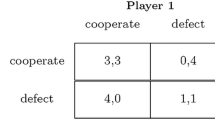Abstract
In the moral machine project, participants are asked to form judgments about the well-known trolley example. The project is intended to serve as a starting point for public discussion that would eventually lead to a solution to the social dilemma of autonomous vehicles. The dilemma is that autonomous vehicles should be programed to maximize the number of lives saved in trolley-style dilemmas. But consumers will only purchase autonomous vehicles that are programed to favor passenger safety in such dilemmas. We argue that the project is seriously misguided. There are relevant variants of trolley to which the project’s participants are not exposed. These variants make clear that the morally correct way to program autonomous vehicles is not at odds with what consumers will purchase. The project is hugely popular and dominates public discussion of this issue. We show that, ironically, the project itself is largely responsible for the dilemma.
Similar content being viewed by others
Change history
02 November 2020
A Correction to this paper has been published: https://doi.org/10.1007/s43681-020-00021-4
Notes
References
Shariff, A., Bonnefon, J.F., Rahwan, I.: Psychological roadblocks to the adoption of self-driving vehicles. Nat. Hum Behav. 1, 694–696 (2017)
Awad, E., Dsouza, S., Kim, R., Schulz, J., Henrich, J., Shariff, A., Bonnefon, J.-F., Rahwan, I.: The moral machine experiment. Nature 563, 59–64 (2018)
Bonnefon, J.F., Shariff, A., Rahwan, I.: The social dilemma of autonomous vehicles. Science 352(6293), 1573–1576 (2016)
Brennan, J.: The Best Moral Theory Ever: The Merits and Methodology of Moral Theorizing. Dissertation. University of Arizona (2007)
Cikara, M., Farnsworth, R.A., Harris, L.T., Fiske, S.T.: On the wrong side of the trolley track: Neural correlates of relative social valuation. SocCognit Affect Neurosci 5, 404–413 (2010)
Furey, H., Hill, S., Bhatia, S.: Beyond the Code: A Philosophical Guide to Engineering Ethics. Routledge, London (2021)
Lanteri, A., Chelini, C., Rizzello, S.: An experimental investigation of emotions and reasoning in the trolley problem. J. Bus. Ethics 83, 789–804 (2008)
Liao, S.M., Wiegmann, A., Alexander, J., Vong, G.: Putting the trolley in order: experimental philosophy and the loop case. PhilosPsychol 25, 661–671 (2012)
Lin, P.: The ethical dilemma of self-driving cars [Video file]. Retrieved from https://www.ted.com/talks/patrick_lin_the_ethical_dilemma_of_self_driving_cars?language=en#t-140814 (2015)
Lombroso, T.: The role of moral commitments in moral judgment. CognitSci 33, 273–286 (2009)
Machery, Edward: Philosophy within its Proper Bounds. Oxford University Press, Oxford (2017)
Nadelhoffer, T., Feltz, A.: The actor–observer bias and moral intuitions: adding fuel to Sinnott-Armstrong’s fire. Neuroethics 1, 133–144 (2008)
R. Noothigattu, S. Gaikwad, E. Awad, S. Dsouza, I. Rahwan, P. Ravikumar, A. D. Procaccia (2017). A voting-based system for ethical decision making. (arXiv)
Pastötter, B., Gleixner, S., Neuhauser, T., Bäuml, K.H.T.: To push or not to push? Affective influences on moral judgment depend on decision frame. Cognition 126, 373–377 (2013)
Petrinovich, L., O’Neill, P.: Influence of wording and framing effects on moral intuitions. Ethol. Sociobiol. 17, 145–171 (1996)
Strohminger, N., Lewis, R.L., Meyer, D.E.: Divergent effects of different positive emotions on moral judgment. Cognition 119(2), 295–300 (2011)
Temkin, L.: Rethinking the Good: Moral Ideals and the Nature of Practical Reasoning. Oxford University Press, Oxford (2012)
Wiegmann, A., Okan, J., Nagel, J.: Order effects in moral judgment. PhilosPsychol 25, 813–836 (2012)
Funding
This material is based upon work supported by the National Science Foundation under Grant No. SES–1734521.
Author information
Authors and Affiliations
Corresponding author
Additional information
Publisher's Note
Springer Nature remains neutral with regard to jurisdictional claims in published maps and institutional affiliations.
The original online version of this article was revised: A funding note had accidentally been omitted in the original publication. The missing funding note is given here: “This material is based upon work supported by the National Science Foundation under Grant No. SES–1734521.”. The original article has been corrected.
Rights and permissions
About this article
Cite this article
Furey, H., Hill, S. MIT’s moral machine project is a psychological roadblock to self-driving cars. AI Ethics 1, 151–155 (2021). https://doi.org/10.1007/s43681-020-00018-z
Received:
Accepted:
Published:
Issue Date:
DOI: https://doi.org/10.1007/s43681-020-00018-z



